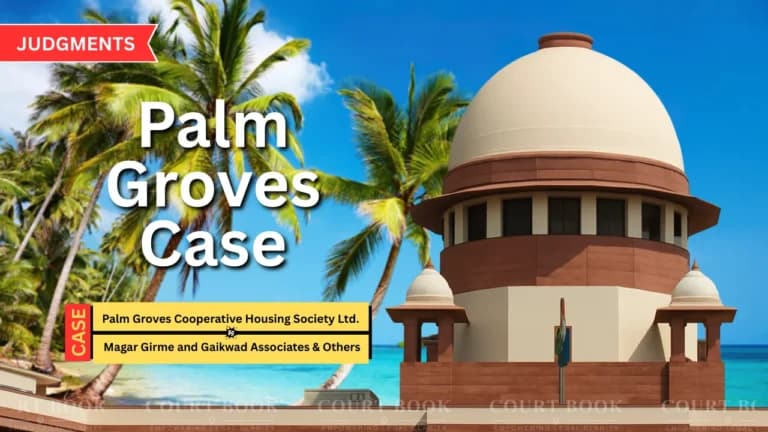The Supreme Court of India delivered an important judgment in Palm Groves Cooperative Housing Society Ltd. vs. M/s Magar Girme and Gaikwad Associates (Civil Appeal Nos. 5536–5538 of 2025), clarifying the scope of execution of consumer forum orders under the Consumer Protection Act, 1986 and its amendments.
Case Background
The dispute began when Palm Groves Cooperative Housing Society, representing flat buyers of the “Palm Groves” project in Pune, filed a consumer complaint against the builder (Magar Girme and Gaikwad Associates) and landowners. The society alleged poor construction, lack of promised amenities, and failure to execute the conveyance deed.
In 2007, the District Consumer Forum partly allowed the complaint. It directed the builder to execute the conveyance deed, hand over necessary documents, and pay ₹5,00,000 as compensation to the society. The bungalow owners were also asked to pay ₹2,00,000 towards compensation.
The State Commission later modified this order, removing the compensation against the builder but retaining other directions. The matter eventually reached the National Commission, which dismissed the society’s execution revision petitions as “not maintainable.” The case then came before the Supreme Court.
Read also:- Parliament Passes Income-Tax Act, 2025 to Replace Six-Decade-Old Law
- Whether revision petitions were maintainable against orders passed in execution proceedings.
- Whether consumer forums had the power to enforce final orders under the 1986 Act (post-2002 Amendment).
- Appellant (Society): Claimed the National Commission wrongly dismissed their petitions. They argued that the 2002 amendment created a legal gap by restricting enforcement to only “interim orders,” which undermined consumer rights. They stressed that the Act was meant to be consumer-friendly and courts should interpret it liberally.
- Respondents (Builder & Bungalow Owners): Contended that the petitions were not maintainable and that the conveyance deed had already been executed in 2006 in favor of the bungalow society. They also argued that remedies lay under Article 227 of the Constitution before High Courts.
- Attorney General & Amicus: Supported a purposive interpretation, pointing out that both the pre-2002 law and the 2019 Act allowed enforcement of “every order.” The anomaly from 2003 to 2020 (after the 2002 amendment) should not leave consumers without remedies.
Read also:- Rajasthan High Court Upholds Execution Order, Allows Restoration of Possession in Decade-Old Land Dispute
Justice Rajesh Bindal, delivering the judgment, noted:
“The Consumer Protection Act is a beneficial legislation. Even if the 2002 amendment created an anomaly, courts must adopt a purposive approach so that consumers are not left remediless.”
The Court held that the 1986 Act is a self-contained code, and forums had the authority to enforce final orders despite the 2002 amendment’s wording. It emphasized that thousands of execution petitions are still pending across forums, and denying enforceability would create injustice.
Case Title: Palm Groves Cooperative Housing Society Ltd. vs. M/s Magar Girme and Gaikwad Associates & Others
Case Type: Civil Appeals (arising out of SLPs)
Appeal Numbers: Civil Appeal Nos. 5536–5538 of 2025
Originating From: Special Leave Petition (C) Nos. 30579–30581 of 2019
Date of Judgment: 2025 (Citation: 2025 INSC 1023)















